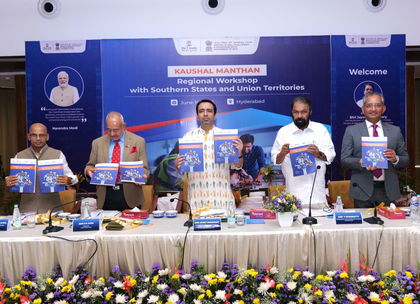Skill development can’t have prescriptive templates: Jayant Chaudhary
By IANS | Updated: June 16, 2025 22:08 IST2025-06-16T22:02:57+5:302025-06-16T22:08:38+5:30
New Delhi, June 16 Skill development cannot have prescriptive templates and we must empower states to craft solutions ...

Skill development can’t have prescriptive templates: Jayant Chaudhary
New Delhi, June 16 Skill development cannot have prescriptive templates and we must empower states to craft solutions that are rooted in their local economic contexts and aligned with the aspirations of their youth, Minister of State (Independent Charge) for Skill Development and Entrepreneurship, Jayant Chaudhary, said on Monday.
Only then can we create meaningful impact and sustained transformation, he added while speaking at the Kaushal Manthan Regional Workshop organised by the Ministry of Skill Development and Entrepreneurship (MSDE) at Kanha Shanti Vanam, Hyderabad.
Underscoring this vision for a more adaptive and responsive ecosystem, the minister announced the establishment of two new Centres of Excellence — out of the five proposed nationwide — at National Skill Training Institutes (NSTIs) in Hyderabad and Chennai.
These centres will serve as national reference points for high-quality instructor training and specialised skilling aligned with emerging domains.
Chaudhary underscored the imperative for states to adopt a more strategic, outcome-oriented approach to skill development — one that is deeply aligned with the aspirations of India’s youth and the evolving demands of the economy.
Recognising that quality training is only as strong as the trainers who deliver it, the Minister called for dedicated investments in faculty development—through improved institutional capacity, competitive remuneration, and rigorous pedagogical standards.
He urged states to adopt a decentralised and data-driven planning framework by working closely with district collectors to develop localised skilling plans, informed by granular skill gap assessments conducted in collaboration with expert bodies like the World Bank.
The minister directed that the CITS (Craft Instructor Training Scheme) certification be made mandatory for all newly recruited instructors, particularly in newly established ITIs across states.
He emphasised that this requirement is critical to ensuring high-quality, standardised instruction across the country.
Further, the minister proposed the establishment of a robust grading and assessment framework for state-owned ITIs, to instil a culture of accountability, quality assurance, and performance-driven outcomes. He encouraged states to leverage platforms such as DISHA meetings to sensitise elected representatives about the role of skilling in economic development and social equity.
Stronger industry linkages, aspirational positioning of vocational education, and language-based training for international mobility were identified as key enablers of a globally competitive workforce. Acknowledging the time-intensive nature of investing in youth, the minister reaffirmed that such investments yield profound, long-term dividends — not just for the individual, but for the nation’s collective progress.
Disclaimer: This post has been auto-published from an agency feed without any modifications to the text and has not been reviewed by an editor
Open in app